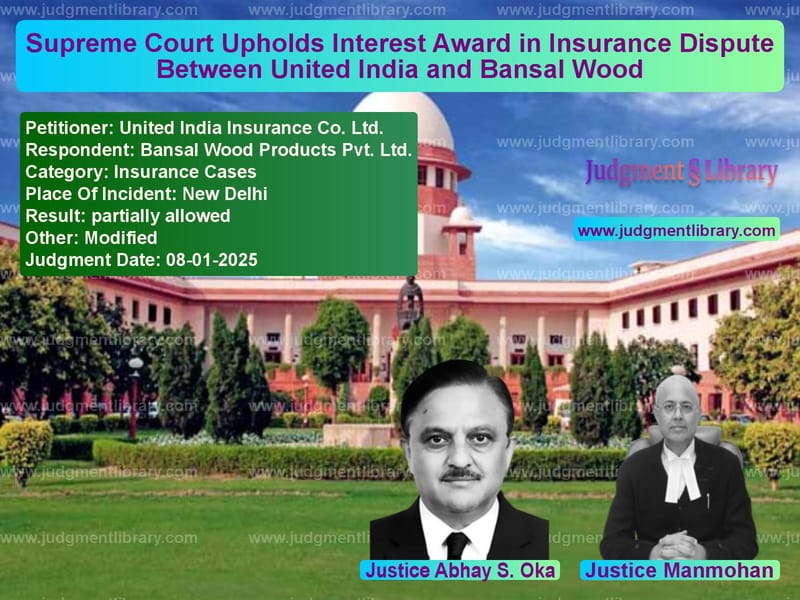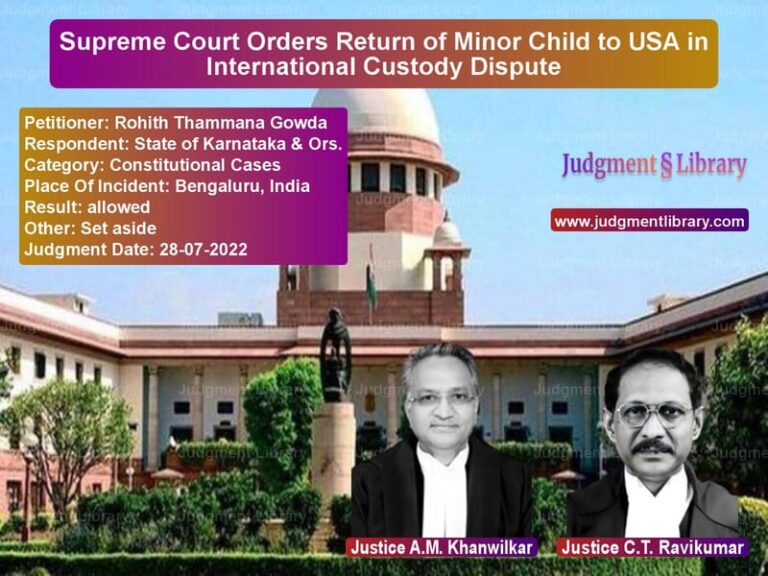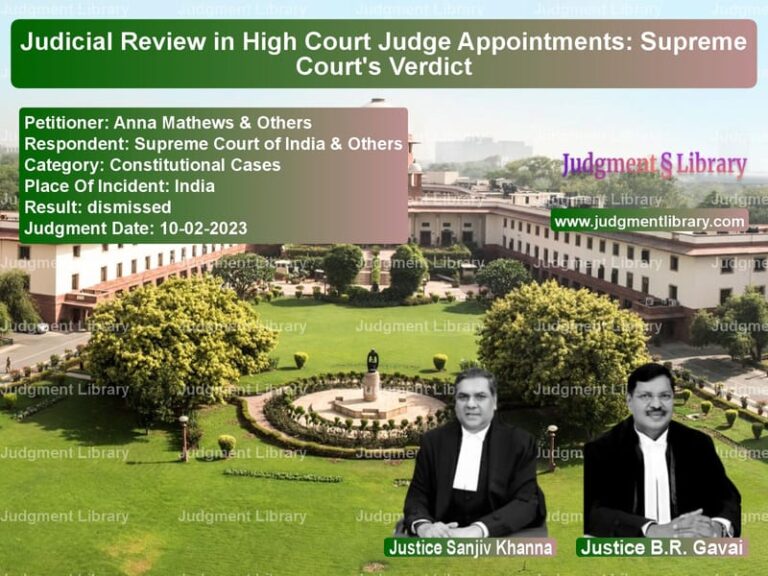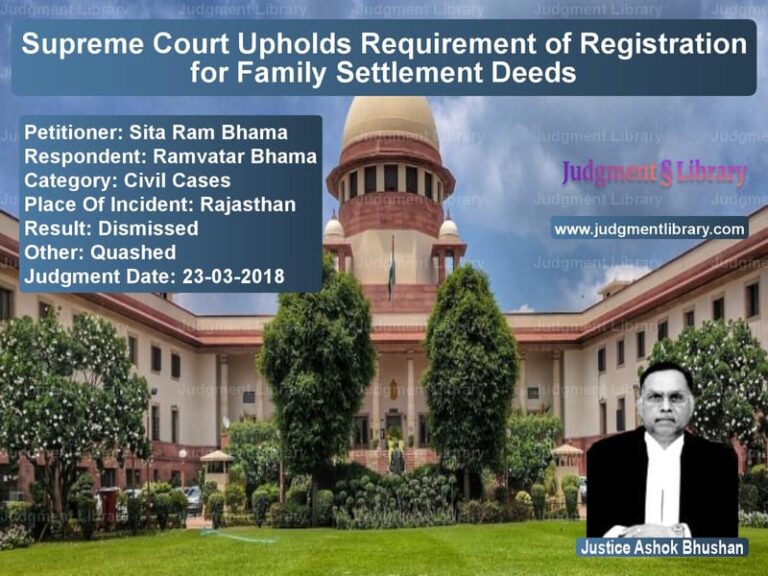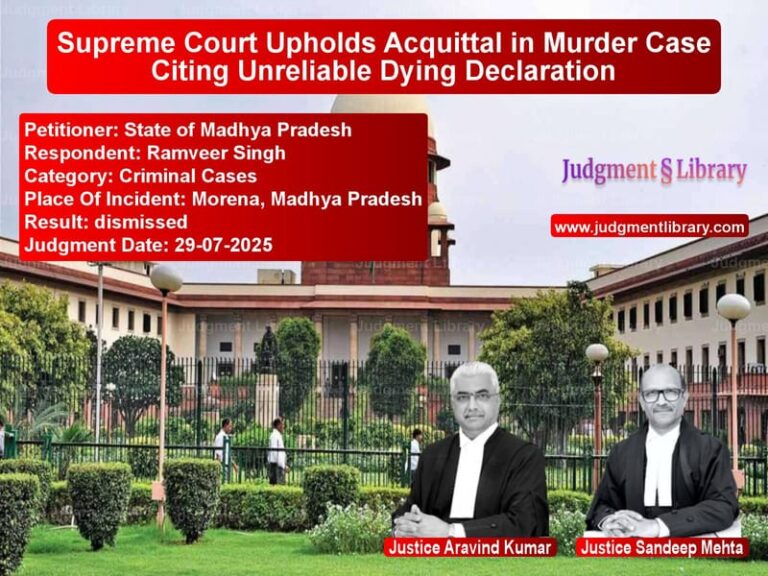Supreme Court Upholds Interest Award in Insurance Dispute Between United India and Bansal Wood
The case of United India Insurance Co. Ltd. vs. Bansal Wood Products Pvt. Ltd. revolves around a dispute concerning the delay in payment of an insurance claim and the calculation of interest for such a delay. The Supreme Court was tasked with deciding whether the insurance company was liable to pay interest for the delayed settlement of the claim, particularly when the delay was partly due to the policyholder pursuing a consumer complaint before seeking arbitration.
The ruling establishes an important precedent in insurance disputes, reinforcing the principle that delays caused by the policyholder seeking legal recourse should not be an excuse for an insurer to deny rightful interest payments.
Background of the Case
Bansal Wood Products Pvt. Ltd., the respondent, had an insurance policy with United India Insurance Co. Ltd., the appellant. After suffering a loss, the respondent filed a claim with the insurer. However, a dispute arose regarding the settlement of the claim, leading the respondent to first approach the National Consumer Disputes Redressal Commission (NCDRC). When the consumer complaint was dismissed, the respondent invoked the arbitration clause within the policy agreement, leading to an arbitral award in its favor.
Chronology of Events
- January 21, 2003: The respondent initially approached the NCDRC for relief.
- December 1, 2006: After an unsuccessful consumer complaint, the respondent invoked arbitration.
- March 6, 2010: The Arbitral Tribunal held that the claim was within limitation, excluding the time spent in consumer litigation.
- February 2, 2023: The High Court of Delhi upheld the arbitral award but did not provide reasons for the interest component.
- January 8, 2025: The Supreme Court reviewed the case and upheld the interest award, modifying the date from which interest would be payable.
Petitioner’s Arguments
United India Insurance Co. Ltd., represented by its counsel, contended that:
- The respondent caused unnecessary delay by pursuing litigation before the consumer commission instead of immediately opting for arbitration.
- The Arbitral Tribunal and High Court did not sufficiently justify why interest should be awarded for the period during which the respondent was engaged in consumer litigation.
- The claim was time-barred, and granting interest from an earlier date was unfair.
Respondent’s Arguments
Bansal Wood Products Pvt. Ltd., through its counsel, argued that:
- The insurer’s failure to settle the claim forced it to seek legal recourse.
- The time spent before the consumer commission was excluded under Section 14 of the Limitation Act, which allows for time spent in pursuing another legal remedy to be deducted from limitation calculations.
- The insurer had a contractual obligation to compensate for the delayed settlement.
Supreme Court’s Analysis
Key Observations
- “An insurance contract obligates the insurer to settle valid claims within a reasonable timeframe. Any delay caused by litigation, unless due to bad faith by the policyholder, should not be used to deny interest payments.”
- “The invocation of arbitration after an unsuccessful consumer complaint is not an unreasonable delay. Instead, it reflects the policyholder’s attempt to exhaust all legal remedies.”
- “The Arbitral Tribunal’s decision to grant interest was valid, and there is no justification to overturn this finding entirely.”
Section 14 of the Limitation Act
The Supreme Court acknowledged that the Arbitral Tribunal rightfully excluded the period during which the respondent pursued its claim before the NCDRC under Section 14 of the Limitation Act. This provision allows for the exclusion of time spent in proceedings that were pursued in good faith before an authority that ultimately lacked jurisdiction.
Final Judgment
The Supreme Court ruled as follows:
- The insurer was liable to pay interest but only from March 6, 2010, when the Arbitral Tribunal confirmed that the claim was within limitation.
- The arbitral award was modified to exclude interest for the period from 2003 to 2010.
- United India Insurance Co. Ltd. was directed to make the balance payment within four weeks.
Implications of the Judgment
This ruling has significant implications for insurance claim disputes:
- Strengthens policyholders’ rights to seek legal remedies without fear of losing interest payments.
- Clarifies the applicability of Section 14 of the Limitation Act in insurance claims.
- Ensures insurers fulfill their contractual obligations and do not use procedural delays to deny payments.
- Encourages fair litigation practices by balancing insurer and policyholder rights.
Conclusion
The Supreme Court’s ruling ensures that insurers cannot exploit legal technicalities to avoid paying interest on delayed claims. By modifying the interest period while upholding the overall award, the judgment balances the interests of both the insurer and the policyholder, promoting fairness in insurance disputes.
Petitioner Name: United India Insurance Co. Ltd..Respondent Name: Bansal Wood Products Pvt. Ltd..Judgment By: Justice Abhay S. Oka, Justice Manmohan.Place Of Incident: New Delhi.Judgment Date: 08-01-2025.
Don’t miss out on the full details! Download the complete judgment in PDF format below and gain valuable insights instantly!
Download Judgment: united-india-insuran-vs-bansal-wood-products-supreme-court-of-india-judgment-dated-08-01-2025.pdf
Directly Download Judgment: Directly download this Judgment
See all petitions in Insurance Settlements
See all petitions in Commercial Insurance Disputes
See all petitions in Legal Malpractice
See all petitions in Judgment by Abhay S. Oka
See all petitions in Judgment by Manmohan
See all petitions in partially allowed
See all petitions in Modified
See all petitions in supreme court of India judgments January 2025
See all petitions in 2025 judgments
See all posts in Insurance Cases Category
See all allowed petitions in Insurance Cases Category
See all Dismissed petitions in Insurance Cases Category
See all partially allowed petitions in Insurance Cases Category

